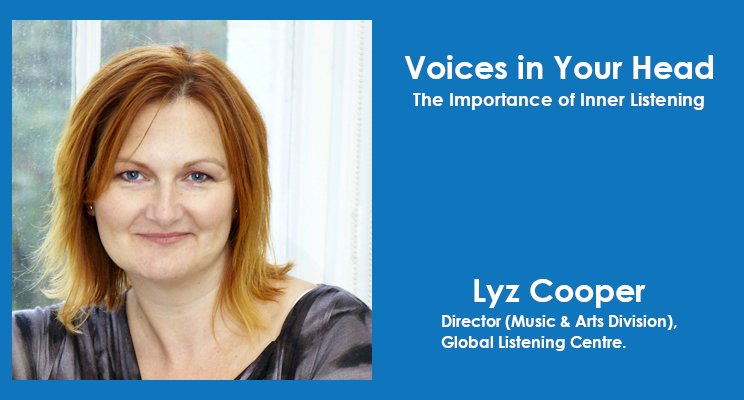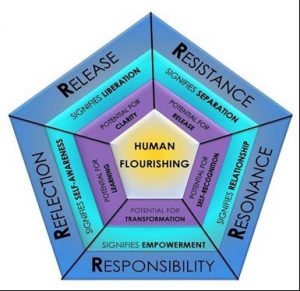
Voices in Your Head: The Importance of Inner Listening
Listening to our inner selves is one of the keys to a happy and healthy life. So many people go through their lives with voices in their head saying ‘I’m not good enough’, ‘there is something wrong with me’ or ‘I am unlovable’, for example. But how can we transform this unhelpful and life-defeating thinking and as a result, lead a happier and potentially healthier life?
In this article I will introduce a model for self-listening and suggest a way to transform unhelpful thoughts and as a result become better listeners to ourselves and others.
Inner Listening
Click on this link to open an audio file in a separate page.
When we look around at society, religious wars, global warming, societal division, inequality, prejudice, racial, gender and sexual discrimination there has never been a more crucial and important time for inner listening. Inner listening can transform society – but how?
Allow me to introduce the Cooper Sax ‘5Rs’ Model of Experiential Processing.
The 5Rs Model of Experiential Processing
The 5Rs Cooper Sax Model of Experiential Processing, or ‘5Rs’ for short is a non-linear model that illustrates the stages we go through during our everyday life as we interact with others, take in our environment and navigate myriad life situations.

Resonance
Resonance signifies a relationship and when this relationship is a positive one, we respond by feeling expansive, light and happy. The more you seek out life affirming situations the more open minded you will become and the more positive your thoughts will be. As a result, there will be less inner conflict and you will be able to listen to others more fully. Resonance is one of the keys to living a healthier and happier life.
Resistance
Resistance happens when there is unhelpful ‘noisy’ inner dialogue – there is no peaceful voice within. In the second visualisation when you were thinking about something that you read in a paper or saw on the TV you may have felt ‘dark, contracted, angry’ for example. If you had listened to the voice in your head it may have said things like ‘life is not supposed to be like this’, ‘they should not be acting like this’, ‘the world is unsafe’ and so on.
Listening to your inner resistance is key to transformation. Sometimes your resistant thoughts may be completely understandable; for example, you may see someone beating an animal and feel angry. This is because the action you are witnessing does not resonate with your own thoughts and beliefs about what is acceptable to you. This is reminding you that you are a kind person that would not beat animals.
However much of the time our resistances are rooted in fear which ultimately comes down to our need to be accepted and survive. I have worked with this module for almost 15 years and have helped so many people to listen to their inner dialogue. Due to the primal need to survive so many of us have unhelpful voices that stop us from living life fully and in resonance but when we change the negative inner voice to a more positive one, we can change lives.
In sound therapy, we use gentle questioning of the unhelpful thoughts plus therapeutic sound and music.
Release
Release is always an indication that resistance is being worked through. Release can manifest physically (e.g. the release of muscle tension), emotionally (often through tears or laughter), mentally (e.g. new insight or awareness), or spiritually (e.g. surrender, upliftment and a renewed sense of connection).
Referring to the “5Rs” model above, release signifies liberation – freedom from resistance. Any time we experience release it is an indication that there was a resistance on some level. Sometimes it is worth looking at what the resistance was – so for example I may have a meditation session and feel so much better afterwards. My inner voice may be telling me that I need to do more of this. I then have the choice whether to listen and make sure I make time for a meditation session every day, or I may ignore my inner voice.
Release is the antithesis of resistance. It is the ‘out breath’ to the ‘holding breath’ of resistance. As the definitions above indicate – it is a ‘letting go’ or a form of surrender which then frees up the energy formerly used to ‘hold on’.
Reflection
Reflection is the simple process of being able to step back from ourselves and listen carefully to what we have to say. Some people find it hard to reflect so a great tip is to view your reactions, thoughts and feelings as if they are on a screen in front of you rather than being caught in them. This will give you the space to be able to hear what you are telling yourself. If it helps, write your thoughts down and look back at the end of the reflection session and read them back. This is a really good way to really listen to what you have to say.
Responsibility
Taking responsibility for our own thoughts, actions and beliefs is another key to inner (and outer) listening. It is a way to set us free from blame and is truly liberating.
No one can make us do feel or think anything. With this in mind encouraging personal responsibility is key to facilitating profound transformation and ‘wholing’. When we refer to the “5Rs” model above we can see that taking responsibility signifies empowerment. When we take full responsibility for our inner dialogue then we have the potential for profound transformation to take place. Everything is a projection based on your own internal beliefs. When we recognise that as a ‘truth’ we realise that we are fully in the driving seat of our process.
I could blame my neighbour for making me feel small because they have the latest technology, car and designer clothing, but this is really showing me that I have a lack of self-worth and am being shown that through the feelings and thoughts I have about my neighbour. This is all about me, and nothing at all to do with my neighbour.
Human Flourishing
At the centre of the model is ‘human flourishing’. Human flourishing is an Aristotelian concept that basically means being the best one can be. This doesn’t mean that we will never feel resistance again, or we will always be able to listen fully, completely and unconditionally. When we are flourishing, we are aware of the inner voice and can feel whether our system is in resonance, resistance or release. Working with this model has made me a much better listener – not only to myself but also to others. If everyone adopted some form of inner listening the planet would be flourishing.
Summary
I hope you have found this model informative and useful. It forms the therapeutic framework that we use at The British Academy of Sound Therapy and enables us to work with a wide range of different clients – from conflict resolution in refugee camps to stressed out corporate executives and everything in-between!
As our inner voices transform, we change the world.
